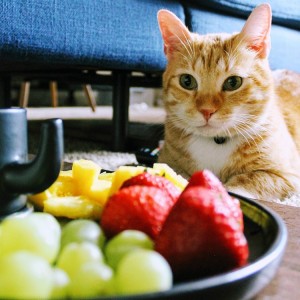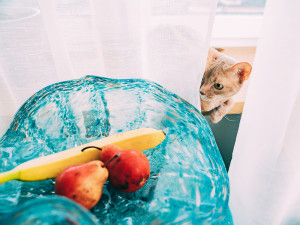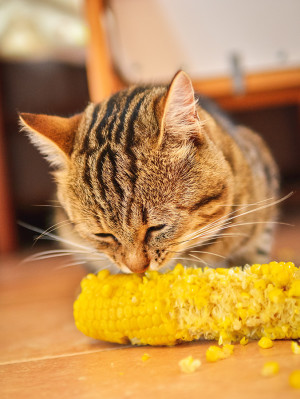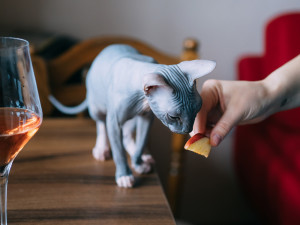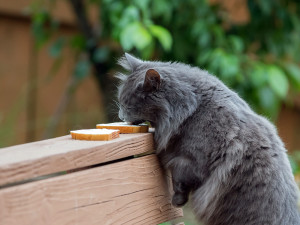Can Cats Eat Lemons?
They don’t go for citrus the same way you do. Here’s why.

Share Article
When life gives you lemons, don’t feed them to your cat. While many of us love lemons when we are on a tart kick, your cat is unlikely to appreciate their flavor. Ingesting certain parts of the lemon or lemon tree can also be toxic to cats, so no, your cats can’t lemons. And while lemons have some valuable health benefits, your cat can get these from other safe fruits and vegetables. Read on to learn more about lemons and cats.
Nutrition facts about lemons for cats
Lemons are the fruit of the Citrus limon tree, a citrus tree grown in warm, sunny climates. The fruits of the lemon tree are very tart and acidic, often used in cooking and as a garnish, but rarely eaten on their own.
Lemons are touted for being high in vitamin C, citric acid, and antioxidants. They also contain decent amounts of fiber and water in the flesh of the fruit. And while some of these nutrients are beneficial to cats, there are better ways for cats to get them while avoiding the negative effects of lemons.
Are lemons good for cats?
Lemons are not considered good for cats for a number of reasons. First, cats have very sensitive senses of smell, and the strong odor of citrus usually turns off most cats. Second, there are compounds in lemons that are not good for cats and in large enough amounts, are considered toxic.

While there are some nutrients in lemons that are healthy for cats, any cat who eats a complete and balanced cat food diet is getting adequate amounts of all of these nutrients already. If you want to supplement your cat’s diet with the occasional treat or table food, there are many other foods that are safer to share and likely to be more appealing to your cat, too. Some of the nutrients that cats can benefit from in lemons include:
Water: Cats are notorious for not drinking much water on their own but they can benefit from staying hydrated just like the rest of us. There are lots of creative ways to encourage your cat to drink more water, including serving them canned food instead of kibble. If your cat has a medical condition like a urinary problem or kidney diseaseopens in new tab, you may need to put these strategies into play.
Fiber: Fiber is an important indigestible carbohydrate that plays critical roles in the digestive tract. It helps to bulk up the stool, prevent constipation, and provides nutrients to the important microbes in the gut.
Antioxidants: Many plants like lemons are rich in antioxidants, including polyphenols.These compounds prevent cell damage from free radicals which may play a role in slowing the aging process, reducing inflammation, and preventing certain kinds of cancer.
Can cats eat any citrus foods?
It is best to avoid citrus for cats for a number of reasons. In general, cats tend to be repulsed by the smell of citrus including lemons, limes, and oranges. This is likely due to the essential oils in the skin of the fruit as well as other compounds that contribute to their odor.
And while the flesh of most citrus fruit is safe in small amounts, other parts of the plant, including the rind and skin of the fruit as well as the leaves, are considered toxic due to essential oils like limonene, and compounds known as psoralens. These can cause digestive upset in cats including vomiting, diarrhea, loss of appetite, and in some cases, may cause tremors and/or skin irritation as well.
Are lemons completely safe for cats?
Lemons are not completely safe for cats and unlikely to appeal to most cats too. Some important considerations include:
Toxic compounds: Lemon peels and plant matter contain essential oils and psoralens which are toxic to cats. Most cats will not eat enough to get sick since they are usually turned off by the smell. They can be at risk for getting sick from more concentrated products, however, like essential oils and/or natural pesticides that may contain higher concentrations of these toxins.
Strong odor: Most cats are downright offended by the smell of citrus so not only won’t they enjoy eating it, they may not even want to be around you if you’re eating it. If you are trying to entice your cat to eat, be sure to keep all the citrus out of sniffing distance.
High acidity: If you happen to have that one-in-a-million cat who does actually like the smell or taste of lemon, you should feel free to let them have the occasional lick or bite of the fruit. However, lemon is a highly acidic food, and if eaten in large quantities or too frequently, that acid can damage tooth enamel and even affect the pH of your cat’s urine, putting them at risk for urinary problems.
The bottom line: Can cats eat human food?
Cats can eat many human foods, and there are lots of safe and healthy snack choices that you can share with your cat. Lemons are a good example of why it is important to do your research first before sharing any new foods with your cat, however. There are some foods that may be perfectly fine for us but can be unhealthy or even toxic to cats.
It’s also important to keep in mind that cats have very different nutritional requirements from humans and even dogs. They are obligate carnivores, which means they need to get the bulk of their diet from animal-derived sources that are high in protein, fat, and other specific nutrients. Eating too many table scraps and treats can fill them up to where they don’t eat enough of their cat food.
This can lead to nutritional deficiencies and illness if it happens regularly. As a general rule, cats should get 90 percent of their daily calories from a complete and balanced cat food source. All table scraps and treats should make up ten percent or less of their total diet.
This ensures they get the nutrients they really need and also helps pet parents be mindful of not overfeeding their cats. Since most cats live exclusively indoors, they have a tendency to also be inactive, and this can lead to weight gain and related health problems. It is important to try to incorporate play into every day and use challenging food puzzles and interactive toys to provide both mental and physical enrichment to help your cat live their healthiest, happiest nine lives.
Other foods that are safe for cats
Plain, cooked shrimp can be a healthy snack for cats.
Berries like blueberries are lower in sugar than many other fruits and make a good choice for the occasional snack.
Broccoli can also be a high-fiber snack in moderation.
Other foods that are dangerous for cats
Grapes and raisins can be toxic and should never be shared
Garlic and other plants in the Allium family are also toxic to cats.
Chocolate is also toxic to cats due to the methylxanthines in it.
FAQs (People also ask)
How much lemon can a cat eat?
The fruit of the lemon is OK only in small amounts such as a few drops of lemon juice or a bite of the fruit.
Is it OK to give cats lemons?
Most cats really don’t like the smell of citrus so it is best to avoid it. The peel can also be toxic to cats.
Why do cats like lemons?
Cats don’t usually like lemons or any citrus due to the smell.
Can cats eat lemons?
Only the fruit itself is safe for cats in small amounts; the skin of the fruit and the plant contain compounds that are considered toxic to cats.

Dr. Amy Fox, DVM
Amy Fox, DVM is a small animal veterinarian in New York City with over thirteen years of experience in a mixture of general practice, emergency medicine, and shelter medicine. A lifelong animal lover, Dr. Fox studied biology in college and then worked as a veterinary nurse before pursuing veterinary school at Cornell University. Her expertise includes surgery, dentistry, and management of chronic conditions, and she is interested in toxicology, pain management, nutrition, care of senior pets, and educational outreach. Dr. Fox also enjoys writing about veterinary medicine and teaching, and her work has previously appeared in Spruce Pets. In her free time, she loves to cook, garden, go for long runs, and hang out with her goofy mixed-breed dog May, who provides never ending comic relief!
Related articles
![an orange and brown cat nibbles corn on the cob]()
Can Cats Eat Corn?
A few kernels won’t hurt, but think twice before doling out a bowl of the stuff.
![Cat eating from a plate of raspberries and blueberries]()
Can Cats Eat Blueberries?
Go ahead and serve up the superfood — with a couple caveats.
Can Cats Eat Peanuts?
They’re not technically dangerous, but they’re not ideal.
![A gray Sphynx cat sniffing an apple slice held out by her owner while standing on a table next to a glass of wine]()
Can Cats Eat Apples?
Yes, but the fruit might not hold much a-peel.
![A woman eating peanut butter toast with her cat laying on the table]()
Can Cats Eat Peanut Butter?
The sweet-and-salty treat is OK in moderation.
![Dark grey cat eating two slices of break laid on top of a wooden railing of an outdoor deck]()
Can Cats Eat Bread?
Go ahead and give your carb-loving cat a few bites, but don’t hand over the bread basket.


